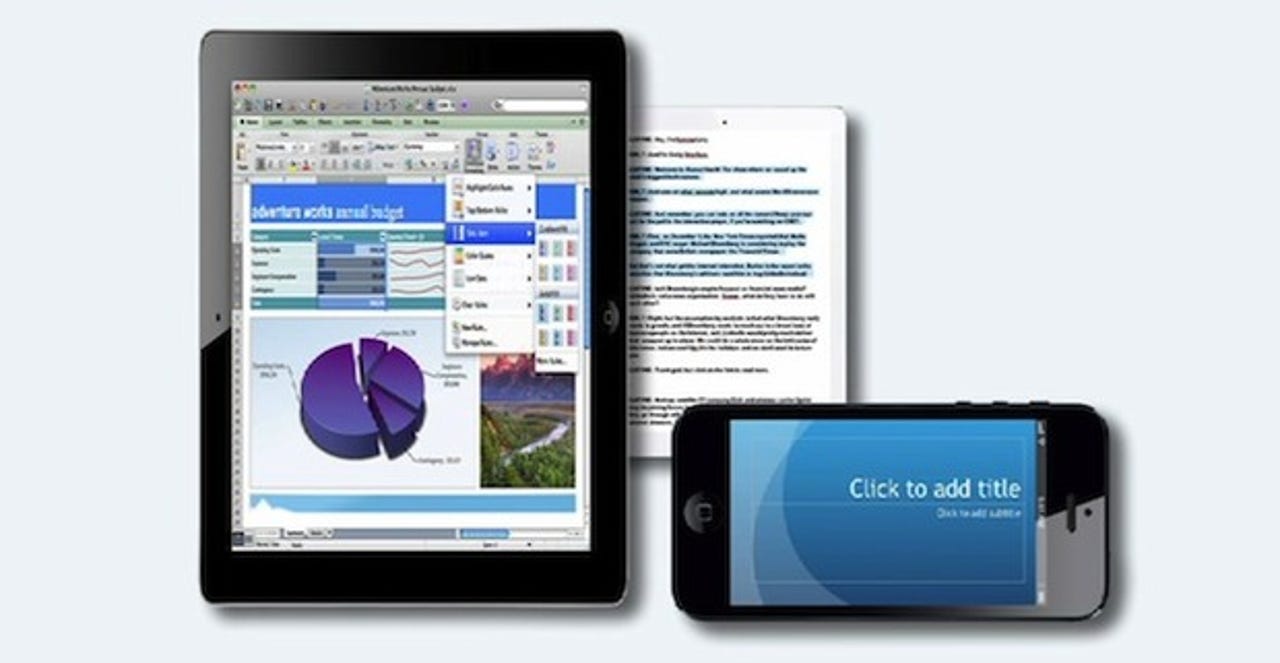Office for iOS, Android on deck for 2014: Will the users wait?

Microsoft can hold off a year to release iOS and Android-based versions of its Office software, but can the users wait?

On-the-go Office users may have to wait another year before they can get their hands on the latest iOS and Android-based versions of the popular productivity suite, according to ZDNet's Mary Jo Foley.
The roadmap published earlier today suggests that in spite of previous reports and hard-hitting claims that Office for iOS (and perhaps a version for Android) will arrive this year, Microsoft may be waiting another few quarters before rolling out its mobile editions.
As Foley points out, the third quarter of 2014 is when the Office team is looking to "support" both iOS and Android versions of the software.
What the roadmap doesn't explain is whether or not this is limited to the iPad, or will be open to iPhone and Android-based phone devices, given that it isn't listed as an iPad-specific release.
Office for iOS and Android-based devices -- while they may seem frivolous to some -- command a great deal of respect in the bring-your-own-device (BYOD) market, as well as among ordinary desk-working enterprise folk.
Can Microsoft wait?
Morgan Stanley analyst Adam Holt said in February that Microsoft may be losing out on as much as $2.5 billion in revenue by failing to get an iPhone and iPad version of Office out the door.
While Microsoft's Office division still takes in around one-fifth of the company's quarterly revenue, Holt's numbers were a little rough around the edges and didn't account for the 30 percent fee that Microsoft would have to pay Apple for each application sale. That is, of course, if Microsoft doesn't take the HTML5 application option or develop a subscription-based service allowing it to avoid the royalty payment.
Windows remains on top in Microsoft's division rankings, according to its second-quarter earnings in January. But with an overall trend decline in PC sales, Windows will suffer in the long term. PCs run Windows, and Windows runs on PCs. The two have a symbiotic relationship and rely on each other to make money.
ZDNet's Ed Bott may have it in for Gartner's figures, but IDC's figures -- albeit published before Gartner's -- came to the same conclusion. The PC market is on the decline while mobile and tablet usage is on the rise.
Smartphones and tablets combined account for nearly six times the 2012 unit market share of desktop PCs, according to IDC. By 2014, Android will have more than 1 billion devices, and Apple's share -- iOS and OSX combined -- will come narrowly behind the number of Windows-based machines on the market.
Whichever figures you read, the overall consensus is that the number of PCs in the market is falling year-over-year. The Windows division will therefore lose money over time and the Office division will step up to the mark. A year-long delay in getting an expanded range of Office mobile applications out the door will impact the software giant's top line, but only if the users stick around long enough to reap the rewards from Microsoft's efforts.
The users can, but likely won't wait
The business and enterprise space has embraced mobile for some time, particularly since the rise of the tablets when the iPad carved out the market in 2010. Four years later, Microsoft will finally release a version of its Office software on the world's most popular tablet -- if the leaked roadmap remains on track.
The majority of businesses still rely on Microsoft Office -- whatever that may look like, whether it's desktop software or a strong integration with Web-based Office 365.
But the primary concern for Microsoft will likely be, simply: Will business users just move on and start using alternatives, particularly if it's merely part of a wider service that offers enterprise collaboration, communications and storage. (Hint: Google).
Office still remains the world's most popular, but Google -- Microsoft's main rival in the productivity space -- is catching up. Google Docs already has mobile working versions out the door, and the search-turned-everything-else giant is picking up the slack.
It doesn't matter that Google doesn't have writing, presentation or spreadsheet apps in the App Store; it has a Web-based service -- something Microsoft will likely try and replicate in order to avoid paying the 30 percent royalty fee to Apple. In doing so, it makes the software cross-compatible with Android while avoiding spending vast sums on developing its own version for the different platform.
But Microsoft's Office is not the be-all and end-all anymore. There are strong, viable alternatives, and the competitors have leapfrogged Microsoft in the mobile space and are only seconds behind on the racetrack.